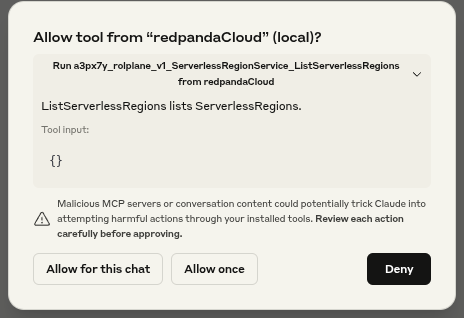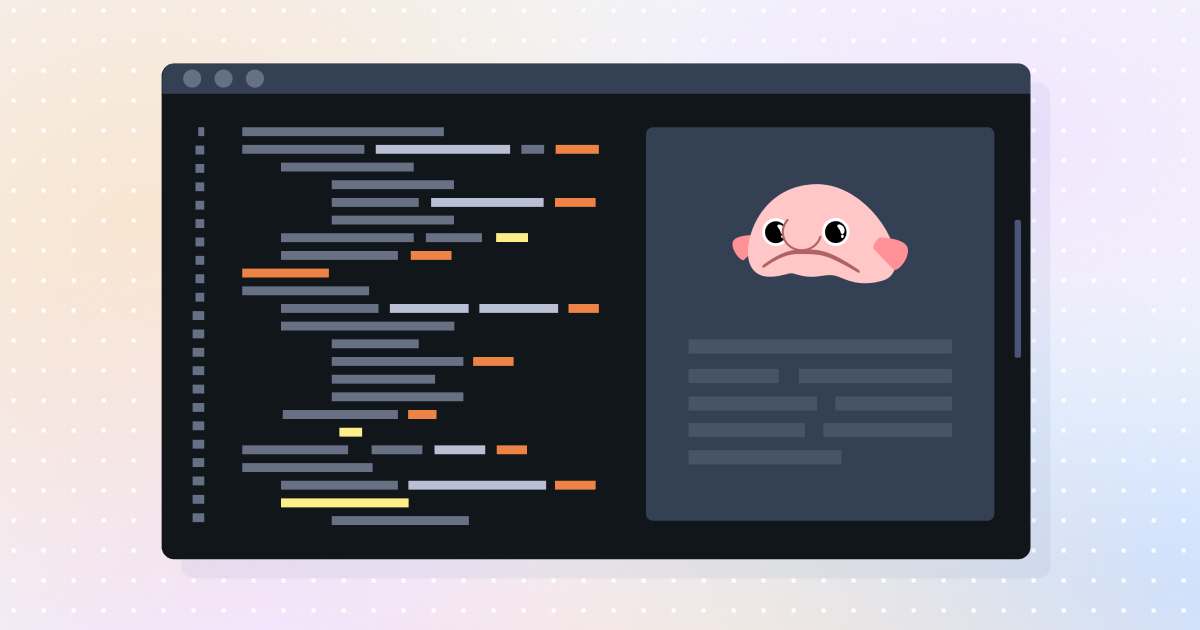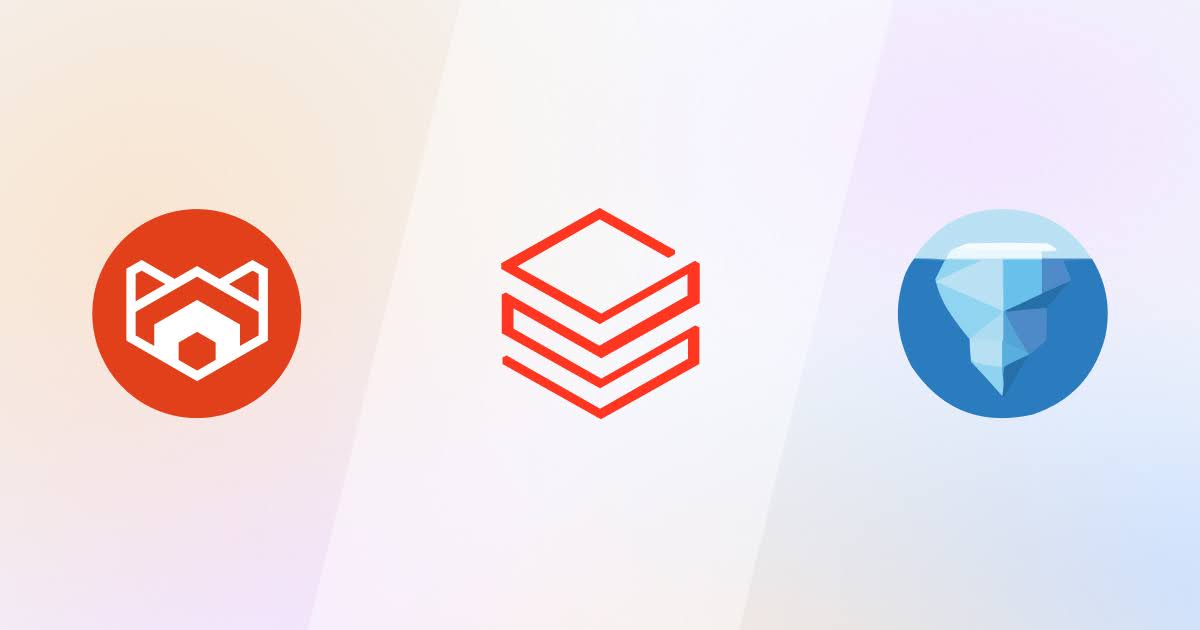
Redpanda Serverless now Generally Available
Zero-ops simplicity meets enterprise-grade security to unlock production-ready data streaming for builders
Meet our open-source compiler plugin that generates Model Context Protocol (MCP) servers for your gRPC or ConnectRPC APIs
You can expose your APIs via MCP with minimal additional effort using an open-source codegen plugin and a small integration layer provided by Redpanda. This tooling auto-generates MCP handlers from your .proto services, outputs JSON Schema for method inputs, wires up to gRPC or ConnectRPC servers/clients, and easily integrates with Buf. The protoc-gen-go-mcp tool generates Go code to translate between MCP and gRPC.
First, install an MCP-enabled client like Claude Desktop and the latest version of rpk. Then, configure Claude Desktop’s claude_desktop_config.json to run rpk cloud mcp stdio and launch the Redpanda Cloud MCP server. After running this command, restart Claude Desktop. Log into Redpanda Cloud with rpk to authenticate the MCP server with your Cloud account. Now, you can use Claude to interact with Redpanda Cloud.
First, install an MCP-enabled client like Claude Desktop and the latest version of rpk. Then, configure Claude Desktop’s claude_desktop_config.json to run rpk cloud mcp stdio and launch the Redpanda Cloud MCP server. After running this command, restart Claude Desktop. To authenticate the MCP server with your Cloud account, make sure you’re logged in. Finally, use Claude to interact with Redpanda Cloud.
Redpanda Cloud provides an MCP server, offering direct integration with LLMs. This is powered by protoc-gen-go-mcp. The most common method for implementing MCP is via stdio, where the MCP client spawns the MCP server as a subprocess and uses stdin/stdout to interact with it. Redpanda’s CLI, rpk, manages translation between MCP and the API (gRPC), as well as authentication.
gRPC and ConnectRPC are strongly-typed RPC/API frameworks built on Protocol buffers. They allow for the bottom-up definition of API contracts with Protobuf and excellent support for code generation. At Redpanda Cloud, these frameworks are used to build and serve APIs, enabling quick iteration where Server and Client stubs are automatically generated and work across programming languages.
With protoc-gen-go-mcp and rpk, Redpanda Cloud becomes a first-class citizen in the world of LLMs. It allows developers using gRPC to expose their APIs via MCP with near-zero effort. This integration offers direct interaction with LLMs and facilitates the translation between MCP and APIs, as well as authentication.
The Model Context Protocol (MCP) is a protocol designed for building large language model (LLM) tools with structured inputs. It's split into two parts: client and server. The client is the actual application you use, like Claude desktop or an AI agent. The server is essentially a plugin that the client interacts with to call tools or read resources. MCP clients can use MCP servers to interact with the world.
Protoc-gen-go-mcp is a Protocol Buffers compiler plugin that generates Go code to translate between MCP and gRPC. It is open-sourced under Apache 2.0 and ready to generate MCP servers for your gRPC or ConnectRPC APIs. Starting with the Protobuf API definition, protoc-gen-go-mcp generates a *.pb.mcp.go for every gRPC Service, which is built to integrate with Go MCP Libraries.
Redpanda helps in turning any gRPC service into an MCP server. It provides an open-source tool, protoc-gen-go-mcp, which generates MCP servers for your gRPC or ConnectRPC APIs. This tool is essentially a Protocol Buffers compiler plugin that generates Go code to translate between MCP and gRPC.
Modern SaaS companies spend a lot of time designing, building, and maintaining APIs across SDKs, CLI tools, and now, LLM integrations. With the rise of the Model Context Protocol (MCP), AI-native interfaces like Claude or Cursor are becoming real API consumers.
This post demonstrates how teams already using gRPC can expose their APIs via MCP with minimal additional effort, thanks to an open-source codegen plugin and a small integration layer — courtesy of Redpanda. Here’s what this new tooling can do:
.proto servicesIf you're building tools for AI agents or just want to future-proof your platform, read on. (If you'd rather just skip to the code, here's the GitHub repo.)
Model Context Protocol (MCP), introduced by Anthropic in November 2024, is a new protocol designed for building large language model (LLM) tools with structured inputs.
MCP is split into two parts: client and server.
An MCP tool can do everything, such as calling a Redis database for a key-value lookup, or call Redpanda Cloud to create a Redpanda cluster or update its configuration.
In short: MCP clients can use MCP servers to interact with the world.
gRPC and ConnectRPC are strongly-typed RPC/API frameworks built on Protocol buffers. The superpower of gRPC is its bottom-up definition of API contracts with Protobuf and its excellent support for code generation.
At Redpanda Cloud, we use gRPC and ConnectRPC to build and serve our APIs. It allows us to iterate quickly, where Server and Client stubs are automatically generated and work across programming languages.
In case you missed it, Redpanda is evolving into an AI-native platform for data streaming and Agentic AI. Our goal: make it as easy as possible for AI agents and apps (like Claude Desktop) to interact with our APIs.
However, it would be a lot of work to write all the code by hand that wraps our API and makes it available via MCP. It’s not just a one-off job either, since APIs evolve continuously. Luckily, we use gRPC, which is code-generation first. Can we simply write a protoc plugin that does all the wiring and mapping? Of course we can!
Introducing protoc-gen-go-mcp — open-sourced under Apache 2.0 and ready to generate MCP servers for your gRPC or ConnectRPC APIs. It’s essentially a Protocol Buffers compiler plugin that generates Go code to translate between MCP and gRPC. Since gRPC has a rich schema (Protobuf descriptors) and generation ecosystem (protogen), it’s the perfect match.

Starting with the Protobuf API definition, protoc-gen-go-mcp generates a *.pb.mcp.go for every gRPC Service. This code is built to integrate with Go MCP Libraries. Currently, we support mcp-go.
The following code demonstrates how easily the compiler translates MCP to gRPC, saving us a ton of time. We have a struct that holds all our gRPC client stubs:
type CloudClientSet struct {
Region controlplanev1connect.RegionServiceClient
Cluster controlplanev1connect.ClusterServiceClient
Network controlplanev1connect.NetworkServiceClient
Organization iamv1connect.OrganizationServiceClient
ResourceGroup controlplanev1connect.ResourceGroupServiceClient
Serverless controlplanev1connect.ServerlessClusterServiceClient
Operation controlplanev1connect.OperationServiceClient
ServerlessRegion controlplanev1connect.ServerlessRegionServiceClient
}The generated code provides functions to wire these up with the MCP server:
controlplanev1mcp.ForwardToConnectRegionServiceClient(s, cl.Region)
controlplanev1mcp.ForwardToConnectResourceGroupServiceClient(s, cl.ResourceGroup)
controlplanev1mcp.ForwardToConnectClusterServiceClient(s, cl.Cluster)
controlplanev1mcp.ForwardToConnectNetworkServiceClient(s, cl.Network)
controlplanev1mcp.ForwardToConnectServerlessClusterServiceClient(s, cl.Serverless)
controlplanev1mcp.ForwardToConnectServerlessRegionServiceClient(s, cl.ServerlessRegion)
controlplanev1mcp.ForwardToConnectOperationServiceClient(s, cl.Operation)
controlplanev1mcp.ForwardToConnectServerlessRegionServiceClient(s, cl.ServerlessRegion)
controlplanev1mcp.ForwardToConnectServerlessRegionServiceClient(s, cl.ServerlessRegion)That’s it! All translation between MCP and gRPC is performed in the generated controlplanev1mcp package and strongly-typed, based on Protobuf semantics.
Check out the example in this Redpanda GitHub repository. You can also see how we use it ourselves within rpk.
Redpanda Cloud now provides an MCP server, offering direct integration with LLMs. And it’s all powered by protoc-gen-go-mcp.
As of April 2025, the most common method for implementing MCP is via stdio, where the MCP client spawns the MCP server as a subprocess and uses stdin/stdout to interact with it. HTTP support (“SSE mode”) exists, but adoption is tiny. The most popular MCP Client - Claude Desktop, only supports stdio mode. So, Redpanda Cloud focuses on stdio mode for now.

Redpanda’s CLI, rpk, facilitates this process. Users already use rpk to interact with Redpanda, Redpanda Cloud, and Redpanda Connect. It manages translation between MCP and our API (gRPC), as well as authentication.
Now, let’s walk through how to install the Redpanda Cloud MCP server to your Claude Desktop.
Prerequisites
Next, run:
rpk cloud mcp install --client claudeThis command configures Claude Desktop’s claude_desktop_config.json to run rpk cloud mcp stdio and launch the Redpanda Cloud MCP server. After running this command, restart Claude Desktop.
Optional: If you don’t use Claude, but a different client, you can do this setup manually, by patching the following JSON into your config:
{
"mcpServers": {
"redpandaCloud": {
"command": "rpk",
"args": [
"--config",
"<YOUR RPK CONFIG FOLDER>/rpk.yaml",
"cloud",
"mcp",
"stdio"
]
}
}
}Most MCP clients use a similar configuration. For example, Cursor.
To authenticate the MCP server with your Cloud account, make sure you’re logged in.
You can do this by running:
rpk cloud login
Claude will show the number of available tools next to the hammer icon. Each tool represents one Redpanda Cloud API endpoint. Clicking on the tools icon shows the names of the available API endpoints.
You can now interact with Redpanda Cloud via Claude! For example, you can create a Serverless cluster, simply by prompting Claude.

As you can see, we automatically make use of the LLM’s reasoning capabilities. One API call failed because the name is already used. It automatically corrected the API call, and then used a different name.
Note: Whenever Claude needs to interact with a tool, it will ask for permission to do so. We recommend using the “Allow once” option and inspecting the tool call and its input. This way, we can make sure the AI does what we want.

Additionally, Redpanda Cloud MCP blocks “Delete” calls by default. This safeguard can be turned off by running the following command:
rpk cloud mcp install --allow-deleteWith protoc-gen-go-mcp and rpk, Redpanda Cloud becomes a first-class citizen in the world of LLMs. Not just that — all developers using gRPC can now expose their APIs via MCP, with near-zero effort.
If you’re looking for more tooling like this to improve the AI journey of your SaaS, check out our Redpanda Agentic AI. If you have questions for our engineers, join the Redpanda Community on Slack.

Zero-ops simplicity meets enterprise-grade security to unlock production-ready data streaming for builders

Smarter autocomplete, dynamic metadata detection, and swifter collaboration

One architecture for real-time and analytics workloads. Easy to access, governed, and immediately queryable
Subscribe to our VIP (very important panda) mailing list to pounce on the latest blogs, surprise announcements, and community events!
Opt out anytime.